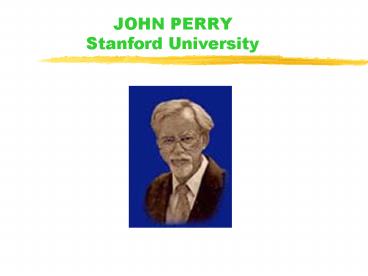JOHN PERRY Stanford University - PowerPoint PPT Presentation
1 / 17
Title:
JOHN PERRY Stanford University
Description:
... is not a soul because we can't make judgments of personal identity about souls. ... about the identity of souls are groundless [since we cannot observe a soul] ... – PowerPoint PPT presentation
Number of Views:142
Avg rating:3.0/5.0
Title: JOHN PERRY Stanford University
1
JOHN PERRYStanford University
2
PHILOSOPHY TALK
- John Perrys NPR show
- Website for show (including downloads)
- http//www.stanford.edu/philosophytalk/
3
The Issue in Perrys Dialogue
- Is personal survival of death possible?
- Possible need not be probable but only logically
conceivable (non-contradictory) (2-3) - Personal what survives is someone who is
identical with me. (3-4)
4
Millers First Approach (5-6)
- Miller The possibility of survival is obvious.
- Weirob The Kleenex box example
- Miller We could make a box totally identical
with one that had been destroyed - Weirob Exact similarity is not identity
5
Millers Second Approach
- Survival can be the survival of a soul (6-7)
- Weirobs basic objection (7-12) a person is not
a soul because we cant make judgments of
personal identity about souls.
6
Weirobs argument (11-12)
- 1. If a person is a soul, then judgments of
personal identity are judgments about the
identity of souls. - 2. Any judgments about the identity of souls are
groundless since we cannot observe a soul. - 3. But judgments about personal identity are not
groundless. - 4. Therefore, judgments of personal identity are
not about the identity of souls. - 5. Therefore, a person is not a soul.
7
Argument over Premise 2 I
- Miller We can infer the presence of a soul from
its correlation with the body (same body, same
soul) (8) - Weirob The needed correlation could be
established only by directly observing the soul
(chocolates example) (10-11)
8
Argument over Premise 2 II
- Miller Judgment about the identity of souls are
based on judgments about the similarity of
psychological characteristics (same
characteristics, same soul) (12) - Weirob Theres no reason to think a succession
of psychological characteristics belongs to the
same soul (river example) (13-14)
9
Argument over Premise 2 III
- Miller I know I have a single soul, so its
plausible that everyone does (15). - Weirob Your experience doesnt show that you
have a single soul, since you cant observe your
soul (16-18).
10
Second Night a New Strategy
- A person is neither a soul nor a body
- Not a soul proved in First Night
- Not a body two arguments (19-22)
- New idea memory as the criterion of personal
identity
11
Identity and Person-stages (22-26)
- Concept of a person-stage
- New statement of problem of personal identity
what makes a group of person-stages part of the
same person - Answer they are related via memory
12
Memory and Survival (27-30)
- Miller its obvious that there can be a person
existing after my death who has all my memories. - Weirob Distinction of real memories and apparent
memories--which already depends on personal
identity (hypnotism example)
13
Memories and Causes (30-32)
- Cohen we can distinguish real from apparent
memories by how they are caused - Miller Right--and that allows us to use the
memory criterion of personal identity to prove
the possibility of survival.
14
The Reduplication Argument (32-3)
- 1. If God can make one heavenly person with my
memories, then he can make two. - 2. If either of these persons were me, both would
be. - 3. Two different persons cannot both be me.
- 4. Therefore, neither heavenly person could be
me.
15
Identity and Transplants
- The Julia North case(38)
- The question who survives--the brain-donor or
the body-donor? (39-40) - Cohen who survives is a matter of convention
(40-41) - Weirobs critique (41-42)
16
The Memory Theory of Identity
- Millers defense of the memory theory
- 1. Explains how we can make judgments of identity
with our eyes closed - 2. Explains the importance of personal identity
17
Critique of the Memory Theory
- The memory theory requires an identical (not just
exactly similar) brain - Given this, it loses its alleged advantages































